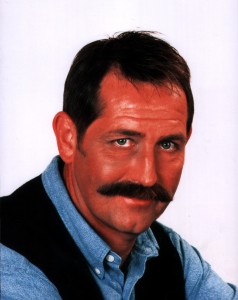
A gradual but inevitable descent into cricket-based loathing and bile.
One Of The Great What Ifs, #3: Marcus Trescothick Overcame The Black Dog
We may have already mentioned that predicting things has turned out to be much harder than we predicted. Nonetheless, following on from our first and second Great What Ifs, we’re continuing to predict what might have been. We like this kind of predicting, because basically no-one can prove us wrong, even though we’re basically just making shit up.
Next up is the sad story of Marcus Trescothick and the end to his Test career back in 2006. But what would have happened had the black dog of depression merely brushed Trescothick’s shoulder and he was able to continue touring?
Perhaps something like this:
England’s tour of India in early 2006 was difficult in several ways. With no Giles or Simon Jones, England’s bowling attack had to be severely reshuffled, resulting in what we’ll politely describe as the failed Ian Blackwell experiment. The absence of Michael Vaughan was more easily covered, with Paul Collingwood slotting into a top seven otherwise unchanged from the 2005 Ashes and with Marcus Trescothick standing in as captain just as he had in Vaughan’s absence on the previous tour of Pakistan. The Somerset opener’s six innings in the series produced 207 runs at an average of 34.5 – far from his best, but a reasonable enough return alongside Andrew Strauss at the top of the order. However his captaincy came in for some criticism, not least in the final Test when the game was approaching its conclusion with a series-saving win looking possible for the tourists. It was in the interval on the final day that Trescothick chose to play James Blunt’s multi-platinum album ‘Back To Bedlam’ to soothe the nerves of his team. Famously, in a later interview, Andrew Flintoff described the resulting atmosphere as “miserable, depressed and angry. Poor Monty Panesar looked like he was about to wet the bed. We should have had some inspiring music, something we could all sing and dance to.”
Things improved slightly for Trescothick in the drawn home series with Sri Lanka, despite him showing remarkable faith in the likes of Saj Mahmood to bowl when others might have just chucked the ball to Flintoff. The Lancastrian was in truth under-bowled, though whether this was really because Trescothick wanted to protect the injury-prone talisman remains in doubt (some sources reported that Flintoff started whistling ‘You’re Beautiful’ whilst fielding in the slips, much to his captain’s annoyance). The real highlight of the series though was the emergence of Alastair Cook at No. 3 as the likes of Ian Bell and Owais Shah found themselves once again on the sidelines.
The second half of the 2006 summer saw Pakistan visit England. With Vaughan still injured, “Banger” remained as captain. This time, the series was a fantastic result for him, with Freddie firing with bat and ball. The series was a whitewash; the final game at the Oval being wrapped up inside three days as for once a Pakistan tour ended without controversy. And so on to the Ashes…
And what an Ashes it was. It has of course gone down in legend as the equal of 2005, with England performing well under the maturing captaincy of Trescothick. He and Flintoff put aside any differences to inspire victory at Perth, before a magnificent captain’s knock of 198* won the game for England in Sydney; a 2-2 draw retaining the Ashes. The series was perhaps even more memorable due to Trescothick’s video diary. He admitted it hadn’t been planned, but he had found himself purchasing thousands of pounds’ worth of hi-tech gadgets at the branch of Dixon’s Tax Free in Heathrow.

51allout fact: Lee Dixon founded an electronics store in his name to help pass the time while playing for Arsenal.
Although they failed to win the World Cup, they were seen as gallant runners-up in their defeat to mighty Australia. From thereon England flourished. Although Vaughan was fit again for the summer of 2007, there was no room for him in the batting line-up and his captaincy was not required. The top three of Trescothick, Strauss and Cook continued to pile on runs, whilst Flintoff helped the evolving pace-bowling attack. England remained undefeated in all forms of the game until they met South Africa 12 months later – and undefeated they remained. After each Test, which England won by ever increasing margins, Graeme Smith looked more and more dejected and it was no surprise that, after a run of 40 runs in five innings, he quit the captaincy. His deputy Ashwell Prince replaced him, but oversaw a truly rotten period for South African cricket. Several star players felt they each deserved to lead the team and the resulting Prince-Kallis-Boucher-Ntini-Gibbs civil war still scars South Africa today.
Perhaps the most remarkable thing about his tenure though was the respect he had from all involved. The partnership between him and coach Peter Moores was solid; with Trescothick the standout batsman in the XI, less-established players like Kevin Pietersen found themselves learning in awe from his performances. He even handled the gradual phasing out of Flintoff admirably, though there were many eyebrows raised in the media when his place was taken by Peter Trego. But still Trescothick’s England continued to hoover up Test series, including West Indies away and the home Ashes in 2009. It was a huge surprise when he stood down from the Test team to focus on ODI cricket; after all, his record of 118 matches and 8955 runs at 45.92 placed him right at the top of the English Test match records, just ahead of Graham Gooch.
Nevertheless, 18 months later and everyone could see why he had made that choice. Although the Moores-Strauss Test team leadership wasn’t quite able to continue the high standards from Trescothick’s era, the ODI team was a joy to watch. Leading from the front with controlled aggression, England powered through the World Cup tournament – the Somerset trio (Trego and young Craig Kieswetter alongside their skipper) at the fore. It was no surprise that the final was billed not just as India vs. England, but also Sachin vs. Marcus. As the sun set on both careers, England did well with the ball, reducing India to just 224. But somehow things went haywire as Zaheer Khan and Sreesanth stepped up. Nobody quite knows what occurred ahead of the England innings – or indeed during it! – but the top order stumbled to 16/3 after the powerplay, all three Somerset men back in the dressing room. Not even an enterprising half-century from Michael Yardy could rescue England and they lost by 95 runs.
The fabled team broke up in the aftermath under new captain Ian Bell (neither Strauss nor Cook had played a ODI for at least two years). Trescothick had a few stints as commentator on Sky TV, but viewers complained about his style, comparing it to a ‘more sorrowful, less entertaining, Bob Willis’. So for now, four years after his final Test and 36 months since that night in Mumbai, he is a cricketing-recluse. Rumours do emerge from time-to-time, but unless an autobiography is published, it seems that the man with more Test runs than any other England player is destined for a quiet life outside of the game he once spectacularly served.



1 Comment
Post a Comment
1
Nobby
24 Sep 2013 20:36
Fuck, that was sad.